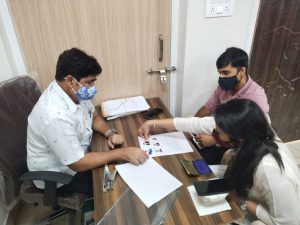
Marriage is a sacred institution in Hinduism, and it is considered a union of two individuals for the purpose of companionship and procreation. In India, the Hindu Marriage Act, 1955 governs the registration of Hindu marriages. The registration of marriage is not only important for legal and social reasons but also helps in availing various benefits such as joint bank accounts, property rights, and inheritance rights. In this blog, we will discuss the step-by-step procedure for registering a Hindu marriage in India.
Step 1: Eligibility
Before proceeding with the registration of the marriage, the couple needs to ensure that they meet the eligibility criteria. The eligibility criteria for registering a Hindu marriage are:
- The bride and groom must be at least 18 years old.
- The bride and groom must not be related to each other within the prohibited degrees of relationship.
- The bride and groom must not be married to any other person.
Step 2: Document Preparation
Once the couple has confirmed their eligibility, they need to start preparing the necessary documents for marriage registration. The documents required for marriage registration are:
- Age proof (birth certificate, school leaving certificate, passport, etc.)
- Address proof (Aadhaar card, voter ID card, passport, etc.)
- Passport size photographs of both the bride and groom.
- Marriage invitation card (if available)
- Affidavit stating the date of birth, marital status, and nationality of both the bride and groom.
- Two witnesses with their identity proofs and passport size photographs.
- It is important to note that the documents must be in the correct format and should be self-attested.
Step 3: Marriage Registration Application
The next step is to fill the marriage registration application form. The application form can be obtained from the marriage registrar’s office or can be downloaded from the official website of the concerned state government. The application form must be filled in duplicate and should be signed by both the bride and groom along with their witnesses. The application form must include the following details:
- Name, age, and address of the bride and groom.
- Date of birth of the bride and groom.
- Nationality and religion of the bride and groom.
- Date and place of marriage.
- Details of the witnesses.
- Signature of the bride, groom, and witnesses.
The application form must be submitted along with the necessary documents to the marriage registrar’s office.
Step 4: Verification of Documents
After receiving the application form and the necessary documents, the marriage registrar will verify the documents and issue a notice of intended marriage. The notice of intended marriage will be displayed on the notice board of the marriage registrar’s office for a period of 30 days. If no objections are this period, the marriage registrar will proceed with the marriage registration.
Step 5: Marriage Registration
On the day of the marriage, the couple, along with their witnesses, must appear before the marriage registrar. The marriage registrar will verify the identity of the couple and their witnesses and solemnize the marriage. The couple must exchange garlands and take the seven vows around the holy fire as per Hindu customs. The marriage registrar will then issue the marriage certificate to the couple.
Step 6: Obtaining Marriage Certificate
After the marriage registration, the couple can obtain a copy of the marriage certificate from the marriage registrar’s office. The marriage certificate is an important document that serves as proof of marriage and can be used for various legal and social purposes.
Conclusion
In conclusion, registering a Hindu marriage in India is a straightforward process. The couple needs to ensure that they meet the eligibility criteria, prepare the the application form, and appear before the marriage registrar on the day of the marriage. It is important to follow the correct procedure and submit the correct documents to ensure a smooth and hassle-free marriage registration process. Registering the marriage is not only important for legal and social reasons but also helps in availing various benefits such as joint bank accounts, property rights, and inheritance rights.
It is also important to note that the procedure for marriage registration may vary slightly from state to state in India. Therefore, it is advisable to check the specific rules and regulations of the concerned state government before proceeding with the marriage registration. It is also advisable to seek the help of a lawyer or a marriage registration consultant to ensure that all the legal formalities are completed correctly and in a timely manner.
In addition to the above procedure, there are a few other points that couples should keep in mind:
- Timeframe: The marriage should be registered within 60 days of the marriage date. After this period, the registration can be done with a penalty.
- Witnesses: The couple needs to have two witnesses with them on the day of the registration. The witnesses should be above the age of 18 and have a valid identity proof.
- Marriage Venue: The marriage can be solemnized at any place, including a temple, home, or any other location agreed upon by both parties.
- Fees: The registration fees for marriage registration vary from state to state. Couples should check with the concerned authority for the fees applicable in their state.
- Inter-caste or Inter-religious Marriages: If the marriage is an inter-caste or inter-religious marriage, the couple needs to provide additional documents such as a conversion certificate, if applicable.
In conclusion, the process of marriage registration for Hindus is a relatively simple and straightforward process. Couples should ensure that they follow the correct procedure and submit the correct documents to ensure a smooth and hassle-free marriage registration process. Registering the marriage is not only important for legal and social reasons but also helps in availing various benefits. Couples can seek the help of a lawyer or a marriage registration consultant to ensure that all the legal formalities are completed correctly and in a timely manner.
Marriage Registration in Thane
Marriage Registration in Malabarhills
Marriage Registration in Cuffeparade
Marriage Registration in Juhu
Marriage Registration in Tardeo
Marriage Registration in Bandra West
Marriage Registration in Worli
Marriage Registration in Dadar
Marriage Registration in Byculla
Marriage Registration in Santacruz
Marriage Registration in Mahim
Marriage Registration in Vasai
Marriage Registration in Bandra East
Marriage Registration in Raigad
Marriage Registration in Andheri East
Marriage Registration in Ghatkopar
Marriage Registration in Bhandup
Marriage Registration in Mumbai Central
Marriage Registration in Kurla
Marriage Registration in Churchgate
Marriage Registration in lalbaugh
Marriage Registration in Navy Nagar
Marriage Registration in Dharavi
Marriage Registration in Nariman Point
Marriage Registration in Kalbadevi
Marriage Registration in Grant Road
Marriage Registration in Malad
Marriage Registration in Borivali
Marriage Registration in Dombivli
Marriage Registration in Palghar
Court Marriage Registration in Pune
Best Family Lawyer in Mumbai
Court Marriage Registration in Mumbai
Court Marriage Registratio in Thane
Court Marriage Registratioc in Pune
Court Marriage Registratio in Mumbai
Court Marriage Registratio in Nashik
Legal Service Provider in Mumbai, Thane, Pune
Marriage Registration in Mumbai
Court Marriage Registration in Mumbai


